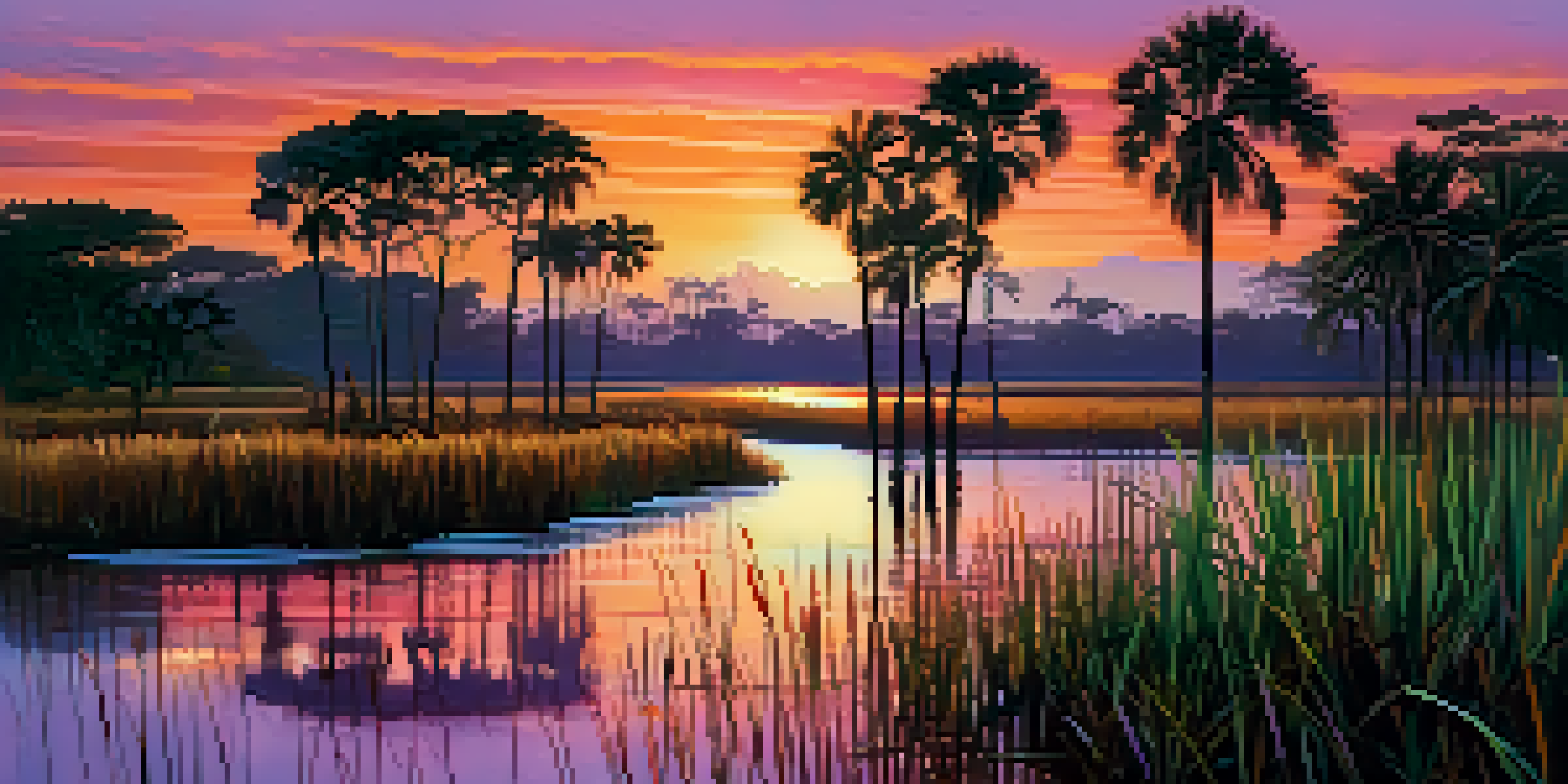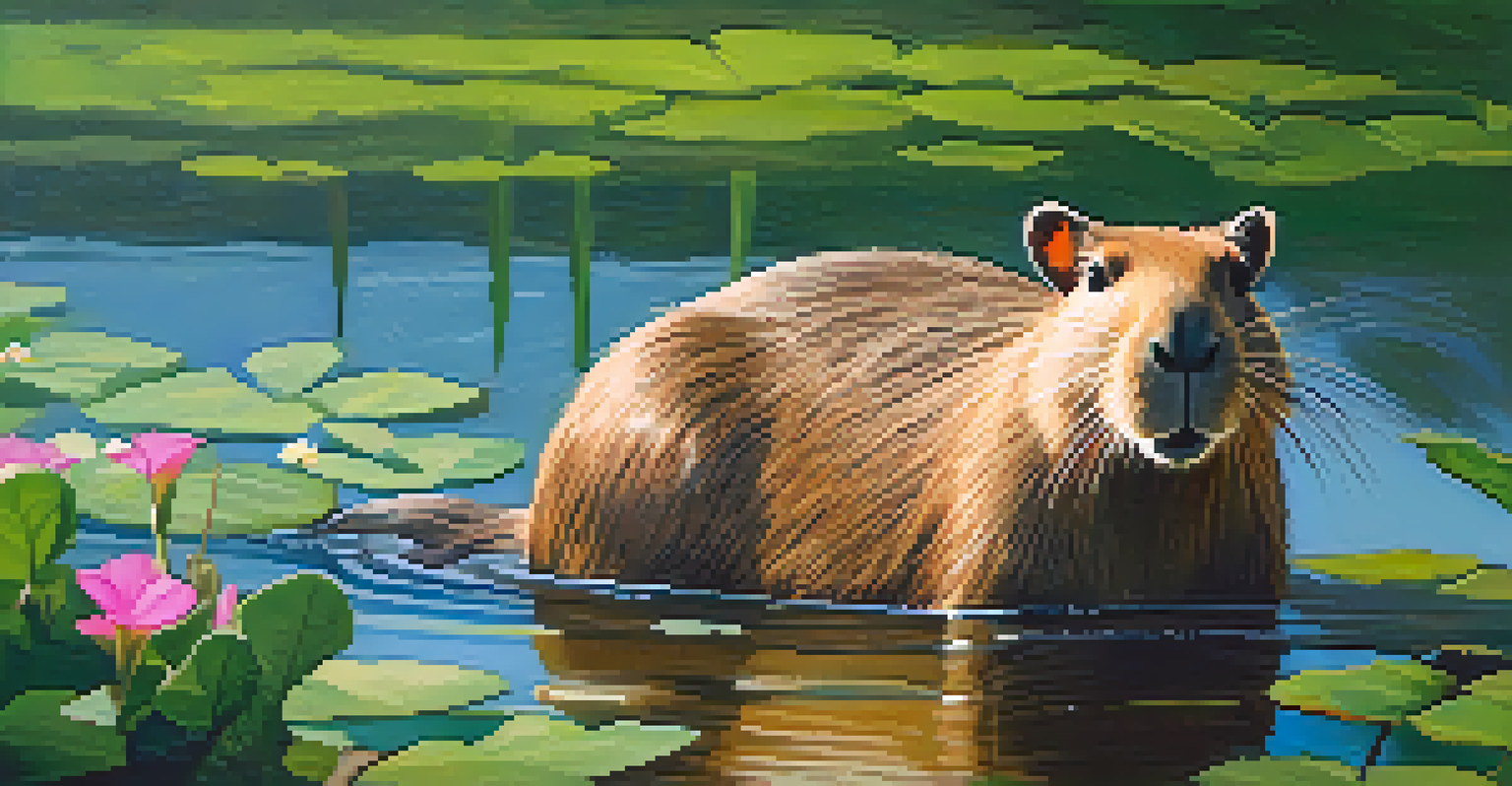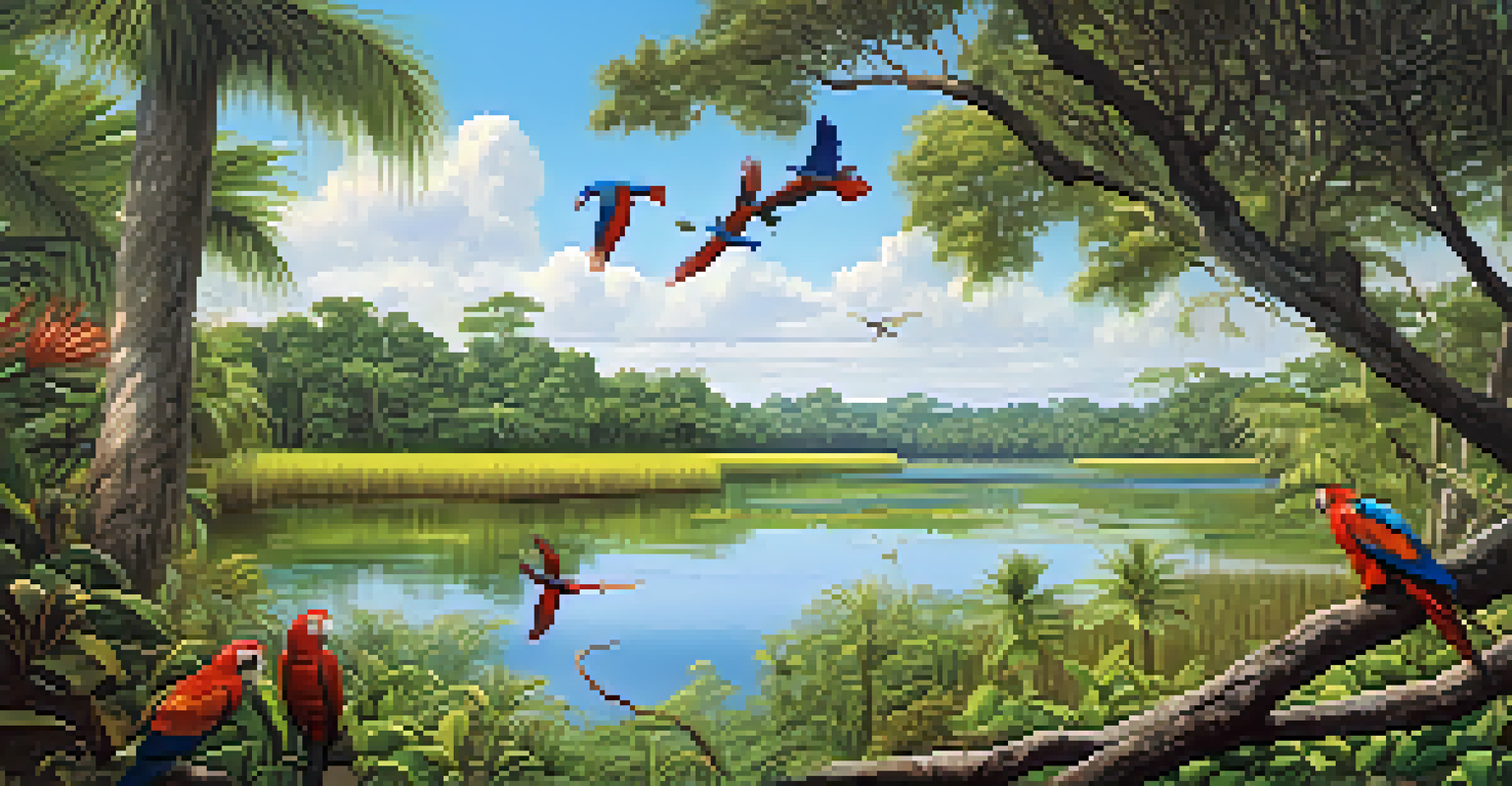The Importance of Brazil's Wetlands for Global Biodiversity

Understanding Brazil's Wetlands: A Biodiversity Hotspot
Brazil's wetlands, including the Pantanal and the Amazon basin, are vital ecosystems teeming with life. These areas are not just beautiful landscapes; they are among the richest habitats on Earth, supporting countless species of plants, animals, and microorganisms. In fact, the Pantanal alone is home to an estimated 1,000 species of plants and over 400 species of birds.
Wetlands are among the most productive ecosystems in the world, providing a range of ecosystem services that are vital to human survival.
Wetlands act as crucial buffers against climate change, absorbing carbon dioxide and regulating local climates. They also provide essential services, such as water purification and flood control, which benefit both wildlife and human populations. Because of their unique characteristics, these wetlands are indispensable for maintaining global biodiversity.
The diverse environments found within Brazil's wetlands, from marshes to swamps, create a mosaic of habitats that support various ecological niches. This rich tapestry of life fosters interactions between species, promoting genetic diversity and resilience in the face of environmental changes. Understanding these ecosystems is key to appreciating their role in global biodiversity.
Unique Flora: The Plant Life of Brazil's Wetlands
The plant life found in Brazil's wetlands is as diverse as it is vital. From towering trees in floodplains to delicate aquatic plants, these regions boast a variety of flora adapted to both wet and dry conditions. For example, the iconic buriti palm thrives in flooded areas, showcasing the unique adaptations of wetland plants.

These plants play a critical role in the ecological health of wetlands, providing food and habitat for various animal species. They also help stabilize the soil and filter pollutants, making the water cleaner and healthier for all forms of life. Without these plants, the entire ecosystem would be at risk.
Brazil's Wetlands: Biodiversity Richness
Brazil's wetlands, such as the Pantanal and Amazon basin, are crucial ecosystems that support a vast array of plant and animal species.
Moreover, many of these plant species have important cultural and medicinal uses for local communities. The traditional knowledge about these plants is invaluable, as it offers insights into sustainable practices that can help preserve both the wetlands and the communities that depend on them.
Wildlife Wonders: Animals of Brazil's Wetlands
Brazil's wetlands are home to a staggering array of wildlife, making them one of the most biodiverse regions on the planet. From the elusive jaguar to colorful macaws, the variety of animal species found here is astounding. These animals play essential roles in their ecosystems, contributing to processes like pollination and seed dispersal.
The loss of wetlands means the loss of biodiversity and the degradation of ecosystem services that benefit humanity.
Many species found in these wetlands are unique to the region, including the capybara and the giant river otter. Their specialized adaptations allow them to thrive in the wetland environment, showcasing the evolutionary marvels that can arise in such diverse habitats. This uniqueness makes the conservation of these areas even more critical.
Wetland wildlife is also a key indicator of environmental health. A decline in animal populations can signal underlying issues such as habitat degradation or climate change. Thus, protecting these creatures is not just about saving individual species but also about safeguarding the entire ecosystem.
The Ecological Functions of Wetlands in Brazil
Wetlands serve many ecological functions that are vital for maintaining environmental balance. They act as natural sponges, absorbing excess rainfall and releasing it slowly, which helps prevent flooding during heavy rains. This water management is crucial for both wildlife and human settlements that rely on steady water supplies.
Additionally, wetlands filter pollutants from water, improving overall water quality. The diverse plant life in these areas traps sediments and breaks down harmful substances, making the water cleaner for all organisms. This natural filtration is an invaluable service that underscores the importance of wetland preservation.
Ecological Functions of Wetlands
These wetlands provide essential services like water filtration, flood control, and habitat for wildlife, highlighting their role in environmental balance.
Moreover, wetlands provide critical breeding and feeding grounds for many aquatic species. This nurturing environment is essential for the life cycles of fish and other aquatic organisms, ensuring that populations remain stable and healthy. The loss of wetlands could disrupt these essential processes and lead to declines in fish stocks.
Threats Facing Brazil's Wetlands and Biodiversity
Despite their importance, Brazil's wetlands face significant threats from human activities. Urbanization, agriculture, and deforestation are rapidly encroaching on these vital ecosystems, leading to habitat destruction and pollution. As wetlands shrink, the biodiversity they support is increasingly at risk.
Climate change is another pressing issue, as rising temperatures and altered rainfall patterns disrupt the delicate balance of wetland ecosystems. These changes can lead to shifts in species distributions and even extinction for some vulnerable species. The combined effects of these threats pose a serious challenge to the conservation of Brazil's wetlands.
Addressing these threats requires a multi-faceted approach that includes sustainable development practices, effective conservation policies, and community involvement. Raising awareness about the importance of wetlands can help garner support for their protection and restoration, ensuring that these ecosystems continue to thrive for generations to come.
Conservation Efforts: Protecting Brazil's Wetlands
Conservation efforts in Brazil are crucial for the protection of wetlands and their biodiversity. Numerous organizations are working to restore degraded wetland areas and promote sustainable land use practices that minimize environmental impact. These initiatives often involve local communities, fostering a sense of stewardship and responsibility towards the wetlands.
Legal protections, such as the designation of protected areas and environmental regulations, play a vital role in conserving these ecosystems. By establishing safe havens for wildlife, these measures help to mitigate the effects of development and pollution. However, enforcement of these laws remains a challenge, requiring ongoing attention and resources.
Threats and Conservation Needs
Human activities and climate change threaten Brazil's wetlands, making conservation efforts vital for preserving these important ecosystems.
Education and awareness campaigns are also essential in promoting the value of wetlands. By informing the public about the ecological and economic benefits provided by these areas, we can inspire collective action to protect them. Community involvement in conservation initiatives can lead to more effective and sustainable outcomes.
The Global Importance of Brazil's Wetlands
Brazil's wetlands are not only vital for local biodiversity but also play a significant role in global ecological health. These ecosystems store vast amounts of carbon, helping to mitigate climate change by reducing greenhouse gases in the atmosphere. Their preservation is essential for maintaining global climate stability.
Additionally, wetlands serve as critical habitats for migratory species, linking ecosystems across vast distances. Birds, fish, and other wildlife rely on these areas during their seasonal migrations, illustrating the interconnectedness of our planet's ecosystems. Protecting Brazil's wetlands contributes to global efforts to conserve biodiversity.

The loss of Brazil's wetlands would have far-reaching consequences, impacting not just local communities and wildlife but also global biodiversity. By prioritizing their conservation, we can ensure that these vital ecosystems continue to provide essential services for both nature and humanity.